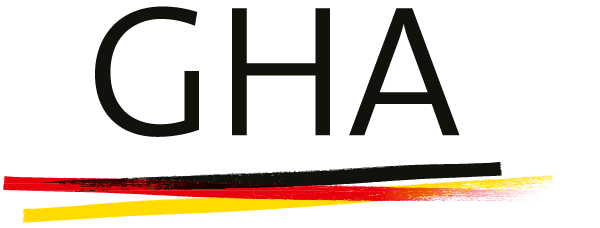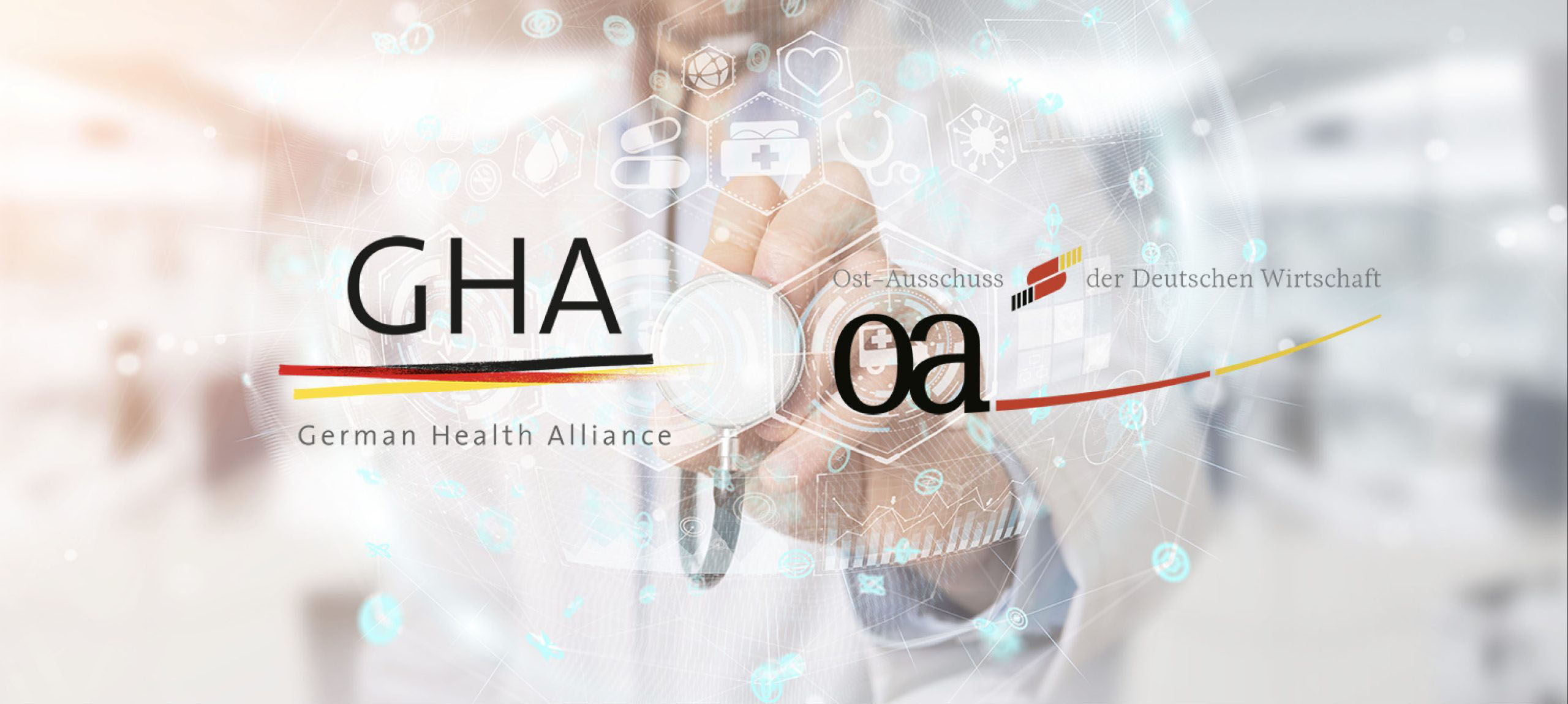

4th German- East European & CIS Health Forum | 22. Oktober 2021

The German Eastern Business Association and the GHA – German Health Alliance invite you to the
4th German- East European & CIS Health Forum
Friday, October 22, 2021
The German-East European & CIS Health Forum, organised by the German Eastern Business Association and the German Health Alliance as an Official Side Event of the World Health Summit, provides a framework for exchange and networking with decision-makers from Germany and the partner countries, company representatives, experts and researchers. The fourth edition of the Forum dwells upon the sustainable recovery plans for the health sector, the innovation potential and investment and cooperation opportunities for German companies in the region particularly with regard to Central and Eastern Europe.
Recap
Hybrid challenge accepted: The 4th German – East European & CIS Health Forum
The 4th German – East European & CIS Health Forum, organised by the German Eastern Business Association and GHA – German Health Alliance, and at the same time the first edition in a hybrid mode took place on 22 October 2021 in Berlin as an Official Side Event of the World Health Summit.
The fourth edition of the Forum dwelled upon the sustainable recovery plans for the health sector, the innovation potential and investment and cooperation opportunities in Central and Eastern Europe (CEE). It provided a framework for enriching exchange and networking with decision-makers from Germany and the partner countries, distinguished company representatives and experts. The starting signal was given by Roland Göhde, Chairman of GHA – German Health Alliance, and Martina Unseld, Spokesperson of the Joint Working Group on Health and Medical Technology at the German Eastern Business Association (OA) and GHA – German Health Alliance.
KEYNOTES:
Dr Thomas Steffen, State Secretary of the Federal Ministry of Health of Germany, underlined the importance of the health industry worldwide as well as its role as a stability factor for the German industry. The subject of intensifying cooperation within the EU and beyond against the backdrop of the vulnerable supply chain was further deepened by Dr Ádám Nagy, Deputy State Secretary for Industry Strategies and Regulation Ministry for Innovation and Technology of Hungary. H.E. Franc But, Ambassador of the Republic of Slovenia to the Federal Republic of Germany addressed the Slovenian EU Presidency’s priorities in the health sector, including the strengthening of the European Health Union and the better access to medical supply globally.
PANEL I: Recovery and innovation plans for the health sector on national and European level – which core topics for the cooperation with German companies?
Moderated by Axel Lohse, Deputy Director and Manager Medical Biotechnology &
Pharma at Health Made in Germany, Panel I tackled a plethora of important framework conditions and innovation drivers focusing on CEE. Focusing on the financing perspective, Adam Kozierkiewicz MD, PhD, gave an insightful outlook by Adam Kozierkiewicz MD, PhD on the European Investment Bank’s (EIB) lending and grants support in health and life sciences. As the EU’s Climate Bank, EIB is committed to growing sustainable finance from billions to trillions € by working with public and private partners. The EIB Group will aim to help unlock at least EUR 1 Trillion of investment by 2030. This will include a marked increase in support for climate adaptation and resilience. Karolina Król, Investment Department Pharma and Medtech, Polish Investment and Trade Agency, addressed the stable economic growth and investment opportunities in Poland, amplifying current financial incentives and vehicles to support investors.
Dr Andrea Ficzere, President of the Hungarian Hospital Association, addressed the current challenges for hospitals including increased health care needs, shortage of skilled health professionals and patient demands. On the other hand, technological progress leads the way to the immense improvement of health care: operational efficiency through digital supply chain, automation and robotics; short hospital stay, new interactions via telemedicine and home monitoring. Joanna Miłachowska, Country General Manager by Siemens Healthineers in Poland, shared her belief that transformational changes will make it possible to increase value in healthcare in terms of medicine being more precise, care delivery shaped by value and focus on patient experience.
PANEL II: Strengthening the cooperation in the Health Sector – an industry perspective
Alongside the continuous efforts to overcome the pandemic situation, other topics remain on top of the agenda for the companies in the health sector such as (post) pandemic framework conditions in the health sector from the industry perspective; public-private partnerships in CEE and beyond; (digital) transformation of the health infrastructure in CEE. Healthcare systems are under constant pressure to increase the quality and efficiency of care and find new ways to use data, systems and provider networks focused on disease prevention as well as treatment. The Public-Private Partnerships (PPP) are an important instrument to achieve this goal. Natalia Korchakova-Heeb, Speaker PPP at GHA and Global PPP Lead at Siemens Healthineers, shared her extensive experience in improving the EU and national PPP frameworks and clarified the major differences between EU, CEE, EU neighbourhood and CIS countries.
Using the example of the ongoing Net4Care project, which aims at improving the quality of care for lung cancer patients in Central and Eastern Europe, Dr Claudia Ivascu, Personalized Healthcare System Partnering Lead at Roche Pharma, provided an overview of the policy elements and enablers that constitute an ideal healthcare ecosystem – planning and enabling, health infrastructure and IT infrastructure, health services and products. Lukasz Warchal, Founder of NubiSoft, has contributed to the digital transformation of the healthcare landscape in Poland. He shared with the audience the lessons learned. Frequent and significant changes in the healthcare system foster technological modernization of IT systems which also change the patient’s mindset. Nevertheless, only well established and adopted technologies guarantee successful and secure digital transformation. As CEO of the leading Mental Med-tech platform in Poland, Helping Hand, Bernard Gołko underlined the aggravated situation during the COVID pandemic, depression has been the second reason for sick leave in the last two years. It is of utmost importance to integrate mental healthcare services in hospitals as well as to foster cooperation with companies in order to minimise the risk of getting in need of therapy. Public-private partnerships would be a key solution in this regard.
Ambitious, flexible, proactive, empowering, focusing on overarching cooperation – these have been a few key messages on the wish list of our speakers regarding the approach towards healthcare and the health industry in Central and Eastern Europe. We are looking forward to keeping track of tackled challenges and transformative projects within the framework of the Joint Working Group of Health and Medical Technology. And finally – please save the date for the 5th German – East European & CIS Health Forum on October 14, 2022!
by Petya Hristova (German Eastern Business Association)



